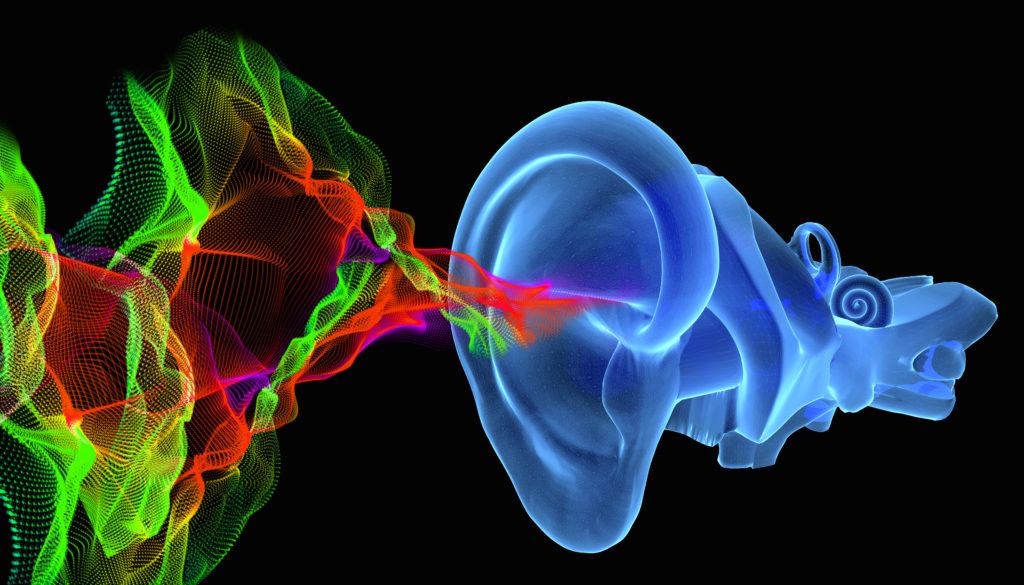
Psychedelic drugs have historically been recognized for their ability to produce changes in various aspects of perception. Upon examining early research conducted on psychedelics and changes in perception, Aday et al.’s recent review article synthesizes evidence drawn from the first era (1895-1975) of psychedelic research.1 Part 1 of this article series provides a summary of the first section of Aday et al.’s review, focusing on research conducted on changes in visual perception.
This article, Part 2, surveys a second portion of their review by examining the early evidence on psychedelics and changes in auditory perception. It highlights key findings drawn from the first era of research on psychedelics and changes in non-visual perception, while it also brings this evidence into conversation with contemporary studies where either resonances or discrepancies in the data exist.
Changes in Auditory Processing
Apart from investigating how psychedelics produce changes in the sphere of visual perception, researchers from the first era of psychedelic science also examined alterations in auditory perception. Behavioral studies conducted during the 1960s and 1970s, for example, found that LSD and other psychedelics reduced auditory sensitivity and led to increases in stimulus generalization.2-4 In contrast, other research conducted during this time period using animal models claimed that, in general, psychedelics produced fewer responses and reaction times overall, while they also appeared to have no effect on stimulus generalization.5-7 These observations of delayed reactions to auditory stimuli were also frequently reported across studies on psychedelics from the 1950s to the 1970s.5-9
Around the same time, other experiments directed at studying the neural correlates of auditory alterations showed that mescaline, in a dose-dependent manner, increased the amplitude, latency, and peak area of the N1 and P1 auditory evoked potential (AEP) components in cats.12 Another notable study from 1971 compared how DMT and LSD differentially affect AEPs, suggesting that while LSD appeared to have no effect, peak DMT sessions showed a disappearance of AEP’s that tended to gradually resurface as the effects of DMT diminished.13 Aday et al. interpret the latter findings as being consistent with more recent studies on DMT, where individuals commonly report increased dissociation from their immediate surroundings.14,15
Auditory hallucinations are another area of research investigated during the first era of psychedelic science; whereas some insisted on auditory hallucinations being common occurrences during psychedelic experiences,16 others considered them to be rare.17 Of the few early studies which quantitatively investigated the occurrence of auditory hallucinations, their frequency was considered to be uncommon.18-20 Instead of interpreting these changes in auditory perception as auditory hallucinations, some researchers during the 1930s and 1950s respectively suggested that these were perceptual distortions of objective stimuli.21,22 Aday et al. believe these results to resonate with contemporary studies wherein alterations in auditory perception have been examined.23-25
Lastly, in undertaking investigations on the effects of music on psychedelic experiences, the first era of research produced several insights that would later be confirmed in more recent studies. In 1970, for instance, researchers suggested that music eased patients’ ability to “let go” during psychedelic therapy sessions, allowed patients to more fully explore their inner mental experiences, and reliably provoked intense emotions.26 Another study published in 1972 study showed that patients benefited more from the music they were most familiar with and that they also considered romantic and religious music as the most significant.27 In addition, it was discovered that music could, at times, “guide” the experience of the patient. These early insights on how music affects mental imagery and emotions during psychedelic experiences, and how these, in turn, are associated with increases in therapeutic value, have been validated in more recent studies,28-30 one of which was the subject of a Psychedelic Science Review article earlier this year.
Conclusions
The effects of psychedelics on perception have proven to be a longstanding area of interest to psychedelic researchers. This article summarized findings drawn from Aday et al.’s review of the first era of psychedelic research (1895-1975) and focused on the effects of psychedelics on auditory perception in particular. Behavioral studies predominantly from the 1960s and 1970s found divergent findings with regards to how psychedelics affect responses to auditory stimuli; however, they more reliably showed that there were delayed reactions to auditory stimuli across both animal and human models. Early investigations on the neural correlates of psychedelic-induced changes in auditory perception found increases in the amplitude, latency, and peak area of the N1 and P1 auditory evoked potential (AEP) components in cats. Other studies on the neural correlates of auditory changes during psychedelic states suggested that peak DMT experiences temporarily reduced AEP altogether, which can be seen as both anticipating and corroborating contemporary research on DMT.
While some first-era studies maintained opposing stances on the rarity of the phenomenon of auditory hallucinations, other investigations fell more in line with contemporary research which considers auditory hallucinations as pseudo hallucinations that stem from perceptual distortions of objective stimuli. Significant insights on the relationship between music and psychedelic experiences were also produced during the first era of psychedelic science, with many of these insights being validated by current research on music and psychedelic psychotherapy.
Stay tuned for further articles in this series discussing changes in tactile processing, body schema, and time perception brought on by psychedelics.
